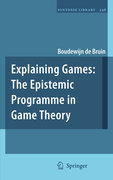
Does game theory ? the mathematical theory of strategic interaction ? providegenuine explanations of human behaviour? Can game theory be used in economic consultancy or other normative contexts? Explaining Games: The Epistemic Programme in Game Theory ? the first monograph on the philosophy of game theory ? is a bold attempt to combine insights from epistemic logic and the philosophy of science to investigate the applicability of game theory in such fields as economics, philosophy and strategic consultancy. De Bruin proves new mathematical theorems about the beliefs, desires and rationality principles of individualhuman beings, and he explores in detail the logical form of game theory as itis used in explanatory and normative contexts. He argues that game theory reduces to rational choice theory if used as an explanatory device, and that gametheory is nonsensical if used as a normative device. A provocative account ofthe history of game theory reveals that this is not bad news for all of game theory, though. Two central research programmes in game theory tried to find the ultimate characterisation of strategic interaction between rational agents.Yet, while the Nash Equilibrium Refinement Programme has done badly thanks tosuch research habits as overmathematisation, model-tinkering and introversion, the Epistemic Programme, De Bruin argues, has been rather successful in achieving this aim. Draws together research in epistemic logic and the philosophy of the social sciences Provides the first book-length contribution to the emerging field of philosophy of game theory Gives a fascinating, new account of payoff-uncertainty Offers a new interpretation of the Nash Equilibrium Refinement Programme and the Epistemic Programme Examines the applicability of game theory in the social sciences and philosophy INDICE: Introduction.- Preliminaries.- Part I Epistemic Logic.- 2. Normal Formal Games.- 3. Extensive Games.- Part II Epustemology.- 4. Applications of Game Theory.- 5. The Methodology of Game Theory.- 6. Conclusion.- A. Notation,Definitions, Theorems.- References.- Index.
- ISBN: 978-1-4020-9905-2
- Editorial: Springer
- Encuadernacion: Cartoné
- Páginas: 200
- Fecha Publicación: 01/08/2010
- Nº Volúmenes: 1
- Idioma: Inglés
